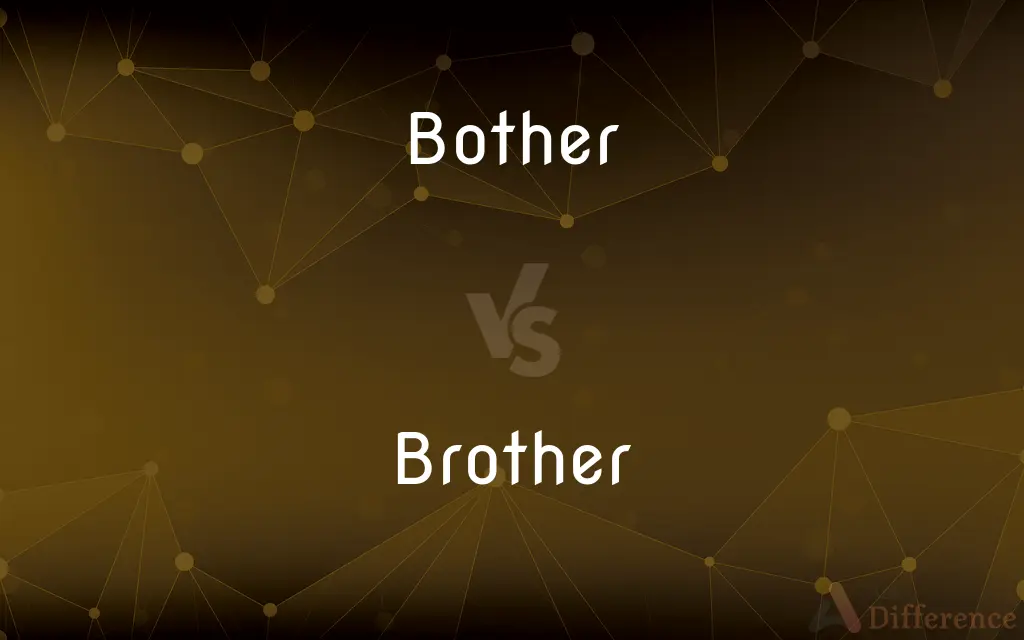Bother vs. Brother — What's the Difference?
By Urooj Arif & Maham Liaqat — Updated on April 1, 2024
Bother refers to causing annoyance or trouble, while brother denotes a male sibling or a man sharing a common affiliation.

Difference Between Bother and Brother
Table of Contents
ADVERTISEMENT
Key Differences
Bother involves causing inconvenience, annoyance, or distress to others. It can be used both as a verb ("Please don't bother the neighbors") and a noun ("It's no bother at all"). On the other hand, a brother is a term of familial relation, referring to a male sibling or, in a broader sense, men connected by shared experiences or affiliations, such as within a fraternity or certain religious or professional groups.
While "bother" implies an action or state that disturbs one's peace or comfort, "brother" embodies a relationship or connection, often implying camaraderie, solidarity, or shared lineage. These terms operate in completely different contexts, with the former being associated with actions or conditions and the latter with personal relationships or memberships.
The act of bothering someone can occur in countless scenarios, from minor nuisances to significant disturbances. Conversely, the concept of a brother extends beyond biological connections, embracing bonds formed through shared ideals, struggles, or affiliations. This broadens the term's applicability from family to communities and organizations.
Bother can have both negative and neutral connotations, depending on the context and intent. Asking for help might be seen as a bother in some situations, while in others, it's a minor or negligible inconvenience. In contrast, brotherhood is generally viewed in a positive light, denoting support, loyalty, and a sense of belonging among individuals.
The distinction between bother and brother highlights the difference between an action or effect that causes disturbance and a familial or fraternal relationship characterized by mutual support and connection. The relevance and implications of each term vary significantly based on the context in which they are used.
ADVERTISEMENT
Comparison Chart
Meaning
To cause annoyance, inconvenience, or distress
A male sibling or a man joined by a common affiliation
Usage
Verb and noun
Noun
Context
Actions or conditions that disturb peace or comfort
Familial relationships or membership in certain groups
Connotations
Can be negative or neutral, depending on context
Generally positive, denoting solidarity and connection
Examples
"Don't bother the dog while it's eating."
"My brother is coming to visit next weekend."
Compare with Definitions
Bother
A situation or matter that causes inconvenience or annoyance.
Filling out the paperwork is a bit of a bother, but it's necessary.
Brother
A male sibling.
My brother and I grew up in the same small town.
Bother
To cause annoyance or trouble to someone.
She didn't want to bother her parents with her problems.
Brother
A member of a fraternity or similar organization.
As a fraternity brother, he participated in many community service events.
Bother
The action of disturbing or interrupting someone.
I hope I'm not bothering you, but could I ask for a favor?
Brother
Used to express fellowship or solidarity among men.
We stood together as brothers during the crisis.
Bother
To take the trouble to do something; make an effort.
He didn't even bother to call and cancel the appointment.
Brother
A man or boy in relation to other sons and daughters of his parents.
He's my younger brother, always following me around when we were kids.
Bother
Feeling worried or concerned about something.
It bothers me that I haven't heard from her in days.
Brother
A man joined to another man by common beliefs or purposes.
He considered his teammates to be brothers in arms.
Bother
To cause to be irritated, especially by repeated acts; trouble or annoy
“I spoke French badly. So I always replied to him in English. This didn't bother him” (Paul Theroux).
Brother
A brother is a man or boy who shares one or more parents with another. The female counterpart is a sister.
Bother
To make agitated or perplexed; upset
“Jerry could see … how much the doctor had been bothered by the failure of the first surgery” (Rick Bass).
Brother
A male having the same parents as another or one parent in common with another.
Bother
To intrude on without warrant or invitation; disturb
“When I saw him slumped in a chair, deep in thought, I decided not to bother him” (Pat Toomay).
Brother
A kinsman.
Bother
To give discomfort or pain to
A back condition that bothers her constantly.
Brother
A fellow man.
Bother
To take the trouble (to do something); concern oneself with (accomplishing something)
“Most people [with the syndrome] have such mild symptoms that they never bother to see a doctor” (Jane E. Brody).
Brother
A fellow member, as of a fraternity, trade union, or panel of judges on a court.
Bother
To take trouble; concern oneself
“old, hard-to-reach coal seams that were too complex or dangerous for other coal companies to bother with” (Jeff Goodell).
Brother
A close male friend; a comrade.
Bother
A cause or state of disturbance.
Brother
A fellow African American man or boy.
Bother
Used to express annoyance or mild irritation.
Brother
Pl. also brethren Something, such as a corporation or institution, that is regarded as a member of a class
“A station that ... relies on corporate contributions or advertising to survive runs the risk of becoming virtually indistinguishable from its commercial brethren” (W. John Moore).
Bother
(transitive) To annoy, to disturb, to irritate.
Would it bother you if I smoked?
Brother
Abbr. Br. or Bro. A lay member of a religious order of men.
Bother
(intransitive) To feel care or anxiety; to make or take trouble; to be troublesome.
Why do I even bother to try?
Brother
Pl. also brethren A fellow member of the Christian church.
Bother
(intransitive) To do something which is of negligible inconvenience.
You didn’t even bother to close the door.
Brother
Son of the same parents as another person.
Bother
Fuss, ado.
There was a bit of bother at the hairdresser's when they couldn't find my appointment in the book.
Brother
A male having at least one parent in common with another (see half-brother, stepbrother).
Bother
Trouble, inconvenience.
Yes, I can do that for you - it's no bother.
Brother
A male fellow member of a religious community, church, trades union etc.
Thank you, brother.
I would like to thank the brother who just spoke.
Bother
A mild expression of annoyance.
Brother
(informal) A form of address to a man.
Listen, brother, I don't know what you want, but I'm not interested.
Bother
To annoy; to trouble; to worry; to perplex. See Pother.
Brother
(AAVE) A black male.
Bother
To feel care or anxiety; to make or take trouble; to be troublesome.
Without bothering about it.
Brother
Somebody, usually male, connected by a common cause, situation, or affection.
Bother
One who, or that which, bothers; state of perplexity or annoyance; embarrassment; worry; disturbance; petty trouble; as, to be in a bother.
Brother
Someone who is a peer, whether male or female.
Bother
An angry disturbance;
He didn't want to make a fuss
They had labor trouble
A spot of bother
Brother
(poetic) Someone who is a kinsman or shares the same patriarch.
Bother
Something or someone that causes trouble; a source of unhappiness;
Washing dishes was a nuisance before we got a dish washer
A bit of a bother
He's not a friend, he's an infliction
Brother
(transitive) To treat as a brother.
Bother
Take the trouble to do something; concern oneself;
He did not trouble to call his mother on her birthday
Don't bother, please
Brother
Expressing exasperation.
We're being forced to work overtime? Oh, brother!
Bother
Cause annoyance in; disturb, especially by minor irritations;
Mosquitoes buzzing in my ear really bothers me
It irritates me that she never closes the door after she leaves
Brother
A male person who has the same father and mother with another person, or who has one of them only. In the latter case he is more definitely called a half brother, or brother of the half blood.
Two of us in the churchyard lie,My sister and my brother.
Bother
To cause inconvenience or discomfort to;
Sorry to trouble you, but...
Brother
One related or closely united to another by some common tie or interest, as of rank, profession, membership in a society, toil, suffering, etc.; - used among judges, clergymen, monks, physicians, lawyers, professors of religion, etc.
We few, we happy few, we band of brothers,For he to-day that sheds his blood with meShall be my brother.
Bother
Intrude or enter uninvited;
Don't bother the professor while she is grading term papers
Brother
One who, or that which, resembles another in distinctive qualities or traits of character.
He also that is slothful in his work is brother to him that is a great waster.
That April mornOf this the very brother.
For of whom such massacreMake they but of their brethren, men of men?
Bother
Make nervous or agitated;
The mere thought of her bothered him and made his heart beat faster
Brother
To make a brother of; to call or treat as a brother; to admit to a brotherhood.
Bother
Make confused or perplexed or puzzled
Brother
A male with the same parents as someone else;
My brother still lives with our parents
Brother
A male person who is a fellow member (of a fraternity or religion of other group);
None of his brothers would betray him
Brother
A close friend who accompanies his buddies in their activities
Brother
Used as a term of address for those male persons engaged in the same movement;
Greetings, comrade!
Brother
(Roman Catholic Church) a title given to a monk and used as form of address;
A Benedictine Brother
Common Curiosities
How is bother used in everyday language?
"Bother" is commonly used to describe actions or situations that cause inconvenience or annoyance, as well as the act of worrying about something.
Can women be part of brotherhoods?
While traditionally gender-specific, the term "brotherhood" can be metaphorically extended to include women in modern contexts, especially in professional or ideological groups.
Can the term brother be used outside of familial contexts?
Yes, "brother" can also refer to men who share common beliefs, purposes, or membership in certain groups, indicating a bond of solidarity.
What does it mean when someone says, "Don't bother"?
"Don't bother" is often used to tell someone not to exert themselves for something considered unnecessary or to prevent causing inconvenience.
What does it mean to bother someone?
To bother someone means to cause them annoyance, inconvenience, or distress.
Who can be considered a brother?
A brother can be a male sibling, or any man connected by shared familial, professional, or ideological ties.
What are common ways people express brotherhood?
Common expressions of brotherhood include shared activities, mutual support during challenges, and a commitment to each other’s well-being.
Is it always negative to bother someone?
Not necessarily; bothering someone can be seen as negative, but it can also refer to minor or negligible inconveniences, depending on the context.
How do brotherly relationships extend beyond blood relations?
Brotherly relationships can extend beyond blood relations through shared experiences, struggles, affiliations in organizations, or common beliefs, fostering a sense of camaraderie and support.
Can the action of bothering be unintentional?
Yes, one can unintentionally bother someone, causing inconvenience or annoyance without meaning to do so.
What signifies a brother in terms of social or professional groups?
In social or professional groups, a brother signifies a member who shares common goals, values, or experiences with others in the group, promoting unity and support.
Is the bond between brothers always positive?
While the bond between brothers is often positive, it can include challenges, rivalry, and disagreements, which are normal aspects of relationships.
How do brothers typically interact in families?
Brothers may interact through shared activities, sibling rivalry, mutual support, and experiencing life milestones together.
Are all brothers related by blood?
Not all brothers are related by blood; the term can also encompass men connected through shared experiences, affiliations, or beliefs.
What are examples of bothering someone at work?
Examples include interrupting colleagues unnecessarily, making loud noises, or frequently asking for help with minor issues.
Share Your Discovery

Previous Comparison
Extraction vs. Extrication
Next Comparison
Cosmos vs. GalaxyAuthor Spotlight
Written by
Urooj ArifUrooj is a skilled content writer at Ask Difference, known for her exceptional ability to simplify complex topics into engaging and informative content. With a passion for research and a flair for clear, concise writing, she consistently delivers articles that resonate with our diverse audience.
Co-written by
Maham Liaqat















































